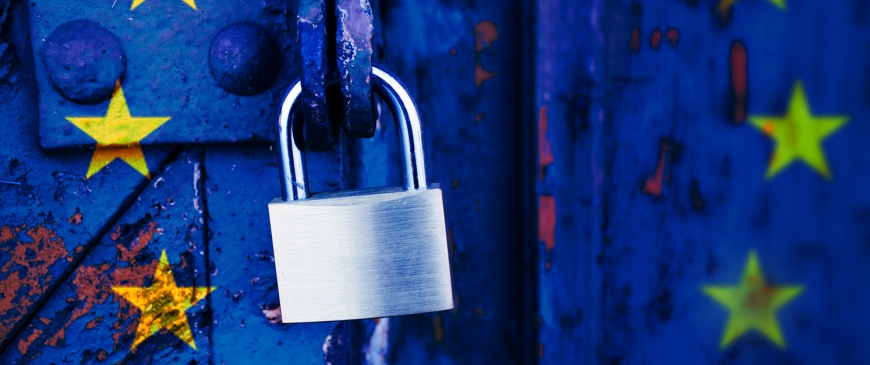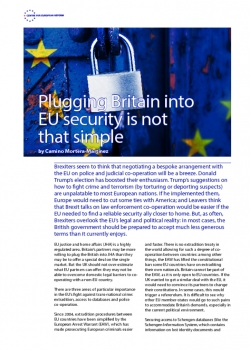
Plugging Britain into EU security is not that simple
Plugging the British into EU police and judicial co-operation will not be easy. And the UK will probably end up with less generous deals than the ones it has now.
Brexiters seem to think that negotiating a bespoke arrangement with the EU on police and judicial co-operation will be a breeze. Donald Trump’s election has boosted their enthusiasm. Trump’s suggestions on how to fight crime and terrorism (by torturing or deporting suspects) are unpalatable to most European nations. If he implemented them, Europe would need to cut some ties with America; and Leavers think that Brexit talks on law enforcement co-operation would be easier if the EU needed to find a reliable security ally closer to home. But, as often, Brexiters overlook the EU’s legal and political reality: in most cases, the British government should be prepared to accept much less generous terms than it currently enjoys.
EU justice and home affairs (JHA) is a highly regulated area. Britain’s partners may be more willing to plug the British into JHA than they may be to offer a special deal on the single market. But the UK should not over-estimate what EU partners can offer: they may not be able to overcome domestic legal barriers to cooperating with a non-EU country.
There are three areas of particular importance in the EU’s fight against trans-national crime: extradition, access to databases and police co-operation.
Since 2004, extradition procedures between EU countries have been simplified by the European Arrest Warrant (EAW), which has made prosecuting European criminals easier and faster. There is no extradition treaty in the world allowing for such a degree of cooperation between countries: among other things, the EAW has lifted the constitutional ban some EU countries have on extraditing their own nationals. Britain cannot be part of the EAW, as it is only open to EU countries. If the UK wanted to get a similar deal with the EU, it would need to convince its partners to change their constitutions. In some cases, this would trigger a referendum. It is difficult to see why other EU member-states would go to such pains to accommodate Britain’s demands, especially in the current political environment.
#Brexiters overlook the #EU's reality: UK will get much less generous terms than it currently enjoys
Tweet thisBluesky thisSecuring access to Schengen databases (like the Schengen Information System, which contains information on lost identity documents and wanted persons) will also be tricky. Norway, Iceland and Switzerland (which, unlike the UK, are outside the EU but inside Schengen) have deals allowing them to participate in Schengen laws and policies. But these agreements come with strings attached: in exchange, Norway, Switzerland and Iceland must make contributions to the EU budget (in 2015 Norway paid €6 million to participate in EU JHA); and they must accept the supremacy of the European Court of Justice (ECJ) over their national courts in matters related to Schengen. ECJ supremacy and budget contributions would be difficult pills for the British parliament to swallow. But without those, it will be hard for the UK to retain the same access it has now to Schengen databases.
In any case, if Britain wants to keep accessing EU databases, it will need to retain EU data protection rules. First, the ECJ will invalidate any agreement between the EU and a third country which does not adhere to EU privacy rules. For example, the ECJ stopped the ‘Safe Harbour’ agreement which allowed for data transfers between the US and the EU. Second, the European Parliament will have a say over who can access Europol databases soon – thanks to the new Europol regulation, which the UK has just opted into. The European Parliament will not allow a country with less-than-satisfactory privacy standards to conclude an agreement on data-sharing with the EU. Six years ago, it overturned an EU-US agreement on a Terrorist Financing Tracking Programme because of privacy concerns. Keeping access to EU databases will be all the more difficult if Theresa May cosies up to Donald Trump. Some of his proposals during the campaign, such as killing terrorists’ families, would be crimes by European standards. As the UK’s intelligence services have a close relationship with the US, EU member-states (and the European Parliament) might be reluctant to share data with the UK if it might also reach the US.
The UK will be able to get an agreement with Europol, regardless of any Trump-related complications. Unlike Schengen, or the European Arrest Warrant, there are precedents for close co-operation between Europol and non-EU, nonSchengen countries. In particular, Europol has association agreements with countries such as the US and Australia. The UK should seek a US-like agreement with Europol. This would enable the UK to place a network of liaison officers from key crime and counter-terrorism bodies at Europol. In exchange, Europol should also be allowed to have officers in relevant British departments.
JHA is not like trade, which creates winners and losers: the only losers from increased co-operation in law enforcement are the criminals themselves. But British participation in some JHA measures will demand compromises with the EU. It would be better for the security of all Europeans if the UK did not rule these out for purely political reasons.
Camino Mortera-Martinez is a research fellow a the Centre for European Reform.

